PIB Headquarters
From 2 to 597: Eklavya Schools Students Succeed in India's Toughest Exams
Posted On:
13 NOV 2025 10:53AM by PIB Delhi
Emerging from remote tribal villages across India, 597 students from Eklavya Model Residential Schools (EMRS) cleared the highly competitive JEE Main, JEE Advanced, and NEET exams in 2024-25—a remarkable surge from just 2 students in 2022-23. This achievement demonstrates how targeted educational support is transforming lives and providing opportunities to Scheduled Tribe students in India's most underserved communities. Among the 230 EMRS schools offering Class 12, 101 have students who successfully cleared these prestigious examinations.
One shining example is Jatin Negi from Sangla village in Himachal Pradesh’s Baspa Valley. Despite growing up in a remote Himalayan village that faces harsh winters and frequent power outages, he cleared JEE Advanced with an All-India Rank of 421 and is now studying B.Tech at IIT Jodhpur.
Padvi Urjasviben Amrutbhai from Khapatia, Gujarat, who studied at EMRS Bartad and cleared the NEET exam, is also a stellar example of the power of education and hard work for empowerment and fulfilling one’s dreams. She is set to achieve her dream of becoming a doctor and is now pursuing MBBS at the GMERS Medical College and Hospital, Junagadh.
Their stories capture the life-changing opportunities created by Eklavya Model Residential Schools.
EMRS Students Who Cleared IIT-JEE Mains, JEE-Advanced & NEET (2024-25)
|
S.No.
|
State
|
JEE Mains
|
JEEAdvanced
|
NEET
|
|
1
|
Andhra Pradesh
|
17
|
1
|
0
|
|
2
|
Chhattisgarh
|
17
|
3
|
18
|
|
3
|
Gujarat
|
37
|
3
|
173
|
|
4
|
Himachal Pradesh
|
3
|
1
|
7
|
|
5
|
Jharkhand
|
6
|
0
|
0
|
|
6
|
Karnataka
|
7
|
0
|
0
|
|
7
|
Madhya Pradesh
|
51
|
10
|
115
|
|
8
|
Maharashtra
|
7
|
2
|
7
|
|
9
|
Odisha
|
10
|
4
|
0
|
|
10
|
Telangana
|
60
|
10
|
24
|
|
11
|
Uttar Pradesh
|
1
|
0
|
0
|
|
12
|
Uttarakhand
|
3
|
0
|
0
|
| |
TOTAL
|
219
|
34
|
344
|
Year-over-Year Performance Comparison (Last 3 Academic Years)
|
Year
|
IIT-JEE
|
NEET
|
|
2024–2025
|
219
|
344
|
|
2023–2024
|
16
|
6
|
|
2022–2023
|
2
|
–
|
What are IIT-JEE and NEET Exams?
Indian Institutes of Technology are prestigious institutions offering engineering and technological education. The Joint Entrance Examination (JEE) is a national-level engineering entrance exam conducted in two stages – JEE Main and JEE Advanced. JEE Main is a screening exam that selects candidates who will be eligible to appear for JEE Advanced, which selects candidates for admission to the IITs. There are 23 IITs in India.
The National Eligibility Cum Entrance Test (NEET) is a common and uniform exam for admission to undergraduate medical education in all medical institutions across India.
Eklavya Model Residential Schools
Established by the Ministry of Tribal Affairs, Eklavya Model Residential Schools (EMRS) impart quality education to Scheduled Tribe (ST) students, enabling them to access opportunities in higher and professional education and secure employment in various sectors.
There are 485 functional EMRS schools in the country with 1,38,336 students enrolled in 2024-25. Overall, a total of 722 schools is sanctioned and Rs. 68,418 lakhs released for the schools.
The grants provided by the Ministry of Tribal Affairs to the state governments under Article 275(1) of the Constitution are meant for the construction of schools and for meeting their recurring expenses. The provision guarantees grants-in-aid from the Consolidated Fund of India each year for promoting the welfare of Scheduled Tribes.
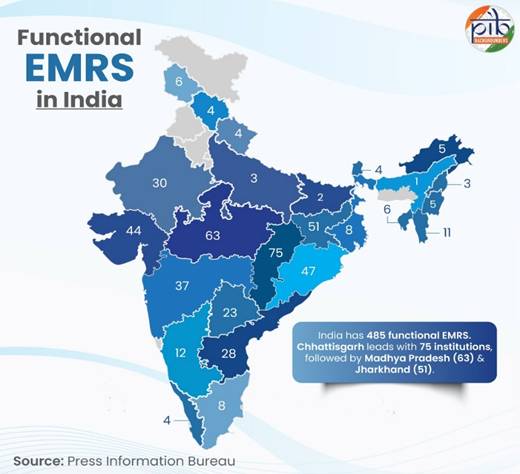
The EMRS scheme was launched in 1997–98. In the Union Budget 2018–19, the Government of India announced that Eklavya Model Residential Schools (EMRSs) would be established in every block with more than 50% Scheduled Tribe (ST) population and at least 20,000 tribal persons. In addition to the 288 EMRSs sanctioned under Article 275(1), 440 EMRSs were proposed across the country, bringing the total to 728 EMRSs to be established nationwide. As of 31.07.2025, a total of 722 EMRSs have been sanctioned, of which 485 have been made functional.
The expansion of EMRSs directly benefits local tribal communities by providing free, high-quality, CBSE-affiliated education to children within or near their own environment. With well-equipped hostels, classrooms, laboratories, and sports facilities, EMRSs ensure holistic development, including academic, physical, and extracurricular growth of tribal students. In addition, students receive free boarding, nutritious meals, healthcare, and career guidance, contributing to their overall well-being and readiness for higher education and competitive careers. Collectively, these measures enhance educational attainment, promote social inclusion, and empower tribal communities economically and socially.
In recent years, the number of students enrolled in EMRS schools, as well as the funds allocated for their development and functioning, have steadily increased.
EMRS Development Leads to Results
Jatin Negi is one of the many students who have benefited from this educational support. He joined EMRS Nichar in 2017 when he was in Class 6.
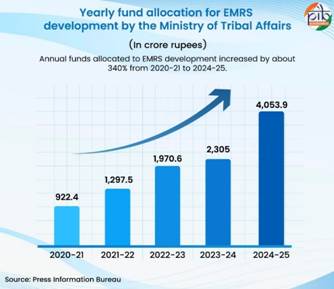
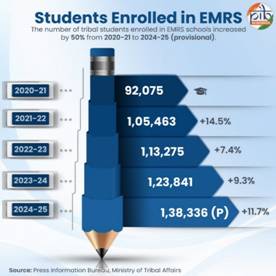
Living in a remote area with limited connectivity, Negi’s schooling was frequently disrupted during the harsh winters, when heavy snowfall isolated his community from the outside world.
“We would have no electricity for two months at a stretch and would have to use solar lamps at night to study. The only connection we had to the outside world was a public microphone at the bus station,” Negi said.
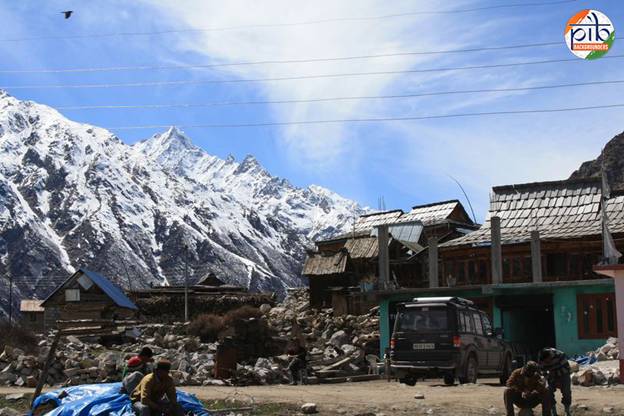
Figure 1 - Negi is from Sangla village in Kinnaur district, Himachal Pradesh, located in the Greater Himalayas. Kinnaur borders Tibet. The image shows Chhitkul village, about 20 km from Sangla.
At the EMRS hostel, he received guidance from his teachers and settled into a structured school routine. "Gradually, I began to understand how the wider world worked," he said.
Negi developed an interest in academics at the EMRS, and his teachers prepared him and other students for competitive exams. "Instead of just preparing us for board exams in the traditional way, they adopted a competitive approach. Tests became regular. We were given detailed feedback with grades and marks. They consistently pushed us to improve, and this regular, disciplined approach transformed our learning experience," Negi said.
Negi's father passed away when he was in Class 12 in 2024, causing him great distress. He struggled to perform well. His EMRS teachers helped him navigate this difficult period and Negi took a year off to prepare for the 2025 exam, which he cleared. "Despite the difficult conditions at home, I stayed focused on my preparation. I would wake up at 6:00 AM, have breakfast, study the entire day, and go to sleep at 2:00 AM. That was my daily routine. Whenever I had doubts, I would ask my teacher," he said.
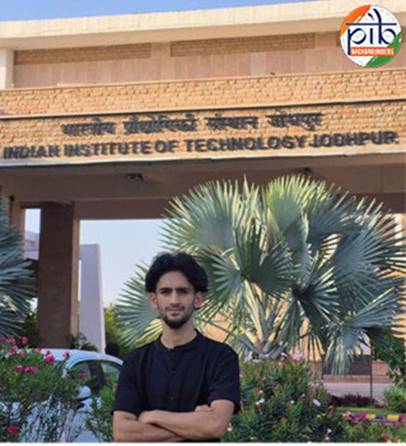
When Negi cleared the tough engineering exam and secured an All-India Rank of 421, his family and community were overjoyed, even though many had not heard of an IIT before. He hopes that his achievement inspires people from all communities to pursue their dreams. "When one person emerges successfully from such a community, others notice, learn from their example, and feel motivated to work hard too," he said.
Padvi Urjasviben Amrutbhai also believes in the power of hard work. Hailing from a small village of a few hundred people called Khapatia in Gujarat, she is one of two sisters. “Villagers used to say to my parents, ‘You don't have a son, what can girls do?’”
Amrutbhai struggled to study in a non-Gujarati medium and lacked confidence in class. Fortunately, she received help from an EMRS teacher who motivated her and encouraged her.
When Amrutbhai achieved a rank of 11,926 in the NEET exam, it reinforced her belief in the transformative power of education and hard work. She believes education can help people overcome social barriers and discrimination. She is now pursuing MBBS at GMERS Medical College and Hospital, Junagadh, and is on her way to becoming a doctor dedicated to providing affordable healthcare.
"I want to tell the villagers that girls can fulfil their dreams. I want to make my parents' name shine," she said.
Laws and Constitutional Provisions Promoting Equity in Education
India's commitment to educational equity through affirmative action is rooted in its Constitution and reinforced through landmark legislation. Affirmative action places students from all walks of life on an equal footing to secure their future and thereby ensure that students from weaker socio-economic backgrounds do not suffer in the long run.
Constitutional Framework
The Constitution of India, through Fundamental Rights and the Directive Principles of State Policy, lays down the legal framework enabling government intervention to ensure that the educational and economic interests of the weaker sections are promoted.
Article 46, under the DPSPs, states that the State shall promote the educational and economic interests of the weaker sections of society, particularly the Scheduled Tribes and Scheduled Castes., and shall protect them from social injustice and all forms of exploitation.
Clauses (4) and (5) of Article 15, a Fundamental Right, also state that the State can make special provisions for the advancement of the socially and educationally backward classes or the STs and SCs. Such special provisions include affirmative action policies for admission into educational institutions, including private ones, but not minority educational institutions. These provisions provide an exception to Clause (2) of Article 29, which states that no citizen can be denied admission into any state or state-funded educational institution on the grounds of only religion, race, caste, language or any of them.
Legislation
Building on these constitutional provisions, the Central Educational Institutions (Reservation in Admission) Bill, 2006 was passed by Parliament and enacted as the Central Educational Institutions (Reservation in Admission) Act, 2006. This landmark legislation mandates reservation of seats in central government-aided and maintained educational institutions: 15% for Scheduled Castes, 7.5% for Scheduled Tribes, and 27% for Other Backward Classes.
The Act applies to premier institutions including IITs, National Institutes of Technology (NITs), Indian Institutes of Management (IIMs), and central medical colleges—institutions that are established, maintained, or aided by the Central Government.
The affirmative action framework continues to evolve through legislative proposals and judicial interpretation.
Special Academic Support Through EMRS
National Education Society for Tribal Students (NESTS), an autonomous organisation under the Ministry of Tribal Affairs, has been established to manage and implement the scheme of EMRS in co-ordination with State EMRS Societies. Various special initiatives support the educational journey of tribal students studying in EMRS schools.
|
Initiative
|
Focus Area
|
Key Details
|
|
Centres of Excellence
|
IIT-JEE & NEET Preparation
|
3 Centres established (Bhopal, Maharashtra, Andhra Pradesh); MoU with 2 NGOs for offline coaching
|
|
Digital Tutoring
|
NEET & IIT-JEE Preparation
|
Digital tutoring for NEET and IIT preparation provided by the Ex-Navodayan Foundation and PACE IIT & Medical
|
|
iHUBDivyaSampark Initiative
|
Science & Technology
|
Joint effort by Department of Science & Technology and IIT Roorkee; experience centres/labs in EMRS for tribal students
|
|
Dedicated DTH TV Channel
|
Curriculum & Competitive Content
|
Collaboration with Central Institute of Educational Technology; delivers content to Classes 9-12 students
|
|
Smart Class Infrastructure
|
Digital Learning
|
Collaboration with ERNET, MeitY; smart classrooms enabled to enhance learning experience
|
|
Skill Development Labs
|
Vocational Skills
|
Labs in schools to promote vocational skills and prepare for future employment
|
|
Amazon Future Engineers Program
|
Computer Science Education
|
Capacity building for 178 teachers from 187 EMRS
|
|
SANKALP Project
|
Vocational Skills Training
|
Establishing vocational skills labs and Training of Trainers (ToT) under Pradhan Mantri Kaushal Vikas Yojna (PMKV) 4.0
|
|
Cyber Security Program
|
AR/VR & Cybersecurity
|
Teacher capacity building in AR-VR and cybersecurity
|
|
CBSE Skill Labs
|
Skills Development
|
Established in 14 EMRS; targeting 50 more schools
|
|
Atal Tinkering Labs
|
STEM & Innovation
|
26 labs established: Equipped with STEM kits, AI modules, electronics, 3D printers for hands-on learning
|
|
CBSE-Linked Skill Courses
|
Vocational Education
|
Instructions issued to select 2 skill subjects for secondary level and 2 for senior secondary from CBSE approved list
|
|
TALASH (Tribal Aptitude Life Skill and Self Esteem Hub)
|
Career Guidance & Counseling
|
Digital psychometric test via web portal; career cards and personalised pathways based on aptitude in 7 core areas; inspired by NCERT's "Tamanna"; developed with UNICEF consultation; Life Skills and Self-Esteem modules
|
RK
References
Press Information Bureau:
Others:
Download in PDF
***
(Release ID: 2189515)
Visitor Counter : 2138